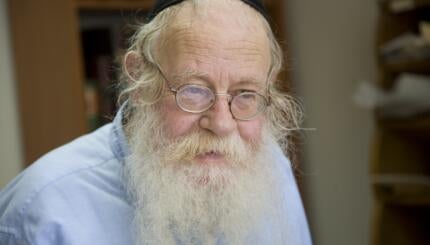Reprinted with permission from American Jewish Fiction: A JPS Guide (Jewish Publication Society).
By the late 1960s, Jewish writers so dominated the field of American literature that non-Jews began to get jealous. In 1968 a Protestant novelist, Edward Hoagland, published a piece in Commentary called “On Not Being a Jew,” which explicated the disadvantage that his non-Jewish heritage had conferred in the literary marketplace. 
Just one month earlier, and much more aggressively, Truman Capote had carped about the ‘Jewish literary mafia” in a Playboy interview. John Updike, who could with only a little facetiousness be called the most well regarded non-Jewish writer of his generation, perceived the same situation as Hoagland and Capote, but his response exhibited much more charm and wit. If you can’t beat ’em, Updike suggested, why not join ’em?
The result was a durable alter ego for Updike, specifically a curmudgeonly American Jewish writer named Henry Bech who began to star in short stories in the New Yorker in the mid-1960s and has persisted for decades. Bech’s first set of comic adventures in the world of letters draws upon Updike’s own: Bech serves as a cultural ambassador on visits beyond the Iron Curtain to the Soviet Union, Romania, and Bulgaria, as Updike did. He lectures at a women’s college in Virginia, smokes pot for the first time, deigns to be interviewed in London, and is inducted into an organization resembling the American Academy of Arts and Letters (which Updike joined in 1964, the same year as Bernard Malamud).
Through it all, Bech remains resolutely ambivalent; a devotee of high culture, unsure what to think about his own literary work, and running around in literary circles rather than writing a new novel, Bech never misses the opportunity for a snappy rejoinder (“Your drinking is famous,” he is told; “Like Hitler’s vegetarianism,” he fires back). He simplifies his correspondence by having rubber stamps manufactured with which to rebuff his admirers (“IT’S YOUR PH.D. THESIS; PLEASE WRITE IT YOURSELF”). And Updike caps all this fun off with a delightful Bech bibliography, a finely wrought parody including citations for all of Bech’s uncollected essays and stories in various magazines of the 1950s (Commentary, the Saturday Evening Post) as well as the articles supposedly written about him by critics such as Alfred Kazin, Norman Podhoretz, and Leslie Fiedler. Cynthia Ozick, as strident as ever, complained that Bech was even more ignorant than typical “indifferent disaffected de-judaized Jewish novelists” and characterized Updike’s sprinkling of Yiddish and Jewish nostalgia throughout the text as the superficial work of “the Appropriate Reference Machine.”
With your help, My Jewish Learning can provide endless opportunities for learning, connection and discovery.
The point of the Bech stories, though, is not an exploration of the depths of Jewishness but the comedy, and pathos, of the experience of being a writer in the United States: in a playful self-interview ostensibly conducted by Bech in 1971, Updike commented that in Bech, a Book he wanted to write “about a writer, who was aJew with the same inevitability that a fictional rug-salesman would be an Armenian.”
In other words, Updike was simply tipping his hat to the massive achievements of Jews in American fiction, and it is not like doing so took him away from his closer-to-home excavations of suburban and small-town American life (one of his finest novels, Rabbit Redux, appeared just a year after the first Bech collection). Bech may be only as Jewish as a non-Jew’s imagination could make him, but he is still very sympathetic-and a sign of his times.
Further reading
The Complete Henry Bech (2001) collects the first batch of stories along with those published as Bech Is Back (1982) and Bech at Bay (1998), plus one bonus story. Updike’s novels include the tetralogy of Rabbit Angstrom books, published under one cover in 1995 and 2003, as well as 1968’s Couples. Updike has been the subject of much criticism, and, amazingly prolific as he is, has published hundreds of essays and reviews as well as a memoir, Self Consciousness (1989). Joyce Carol Oates–a non-Jewish American writer who is about as prolific as Updike–has also written about Jews, for instance in The Tattooed Girl (2003). For a mirror image of the non-jew writing as a Jew, see, among others, Saul Bellow’s Henderson the Rain King (1959).


